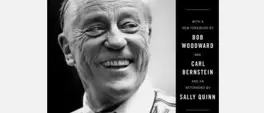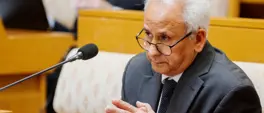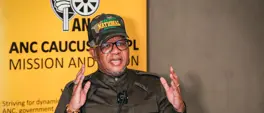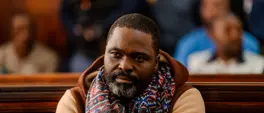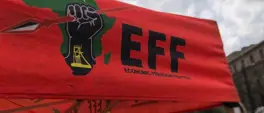YONELA DIKO: Foreign policy has been Ramaphosa’s magnum opus
Yonela Diko
5 November 2024 | 7:10Despite inheriting SA's eroding moral authority, Ramaphosa has shown that our leaders are still capable of achieving remarkable things, on a local and global scale, writes Yonela Diko.
South Africa’s first democratic president, Nelson Mandela, established the fundamental principle of our country's foreign policy when he said: “Human rights will be the light that guides our foreign policy.”
Madiba went on to fight the violation of human rights and injustice wherever it reared its ugly head around the world.
Over the years, due to the erosion of moral authority and the tainted image of our leaders, our ability to be a voice of reason in world affairs was compromised, and the country has veered off from its commitment and courage to stand and fight for human rights as articulated by Madiba.
This is the country Ramaphosa inherited. A country that had lost its moral standing in the world and its place as a star that guides the globe on human rights in a world increasingly defined by a clash of national interests and selfish pursuits over human rights.
It became Ramaphosa’s governing responsibility to restore South Africa’s moral standing, and renew our country's rightful place among the league of nations. In this work, Ramaphosa has shown that our leaders are still capable of achieving remarkable things.
His efforts have taken place amidst a shifting global balance of forces. The world is moving from a unipolar one where half the globe used to dictate the order of things into a multipolar world, where even the most powerful are constrained.
There is also a shift into more inclusive global groups, from G7 to G20, in acknowledging the importance of emerging new powers.
CLIMATE CHANGE
The first area of foreign policy that Ramaphosa mastered was to make climate change a key foreign policy imperative, which immediately garnered global respect, particularly at COP23.
Our ambitious carbon reduction targets put pressure on other leading carbon emitters to make bolder commitments and finally give climate change the seriousness it deserves.
Critics were quick to deride the President for overcommitting the country on climate change while it was battling an energy crisis. They did not see the bigger picture of South Africa establishing itself as a moral superpower which would put the country in good stead for the moral battles that lay ahead.
Climate change is about the survival of the world and the unfairness of its consequences, which aligns perfectly with South Africa’s human rights foreign policy.
BRICS
While Former President Jacob Zuma established good relations and camaraderie with BRICS leaders, Ramaphosa has taken these relationships to new heights through firm solidarity and economic benefits.
Ramaphosa’s standing among the BRICS nations reached its magnum opus when he hosted the 15th BRICS Summit, which set a stage for the now expanded intergovernmental organisation, and made the world notice BRICS as the new centre of global power.
Ramaphosa’s calm character and personal touch has been an asset inside BRICS, and his ability to speak boldly in all international forums has established him as a measured man who can be trusted as an ally and a friend.
It is this confidence that Ramaphosa enjoys inside BRICS and other multilateral platforms that made him to lead a six African Presidents delegation to Russia and Ukraine, to try and bring Africa’s perspective on the conflict, and our firm belief that all conflicts must ultimately be resolved around the table.
This trip was also important for Africa to make in order to ensure continued open channels of trade with the continent and that part of the world.
Again, this move was scorned by critics thinking Africa was punching above its weight, and that the impact of such a visit would be minimal. But it missed once more Ramaphosa’s strategic move to establish the country as a moral superpower that could be counted on to champion peace.
It is this confidence Ramaphosa enjoys around the world and moral authority our country now commands that gave Ramaphosa courage, soon after a Russia-Ukraine trip, to go to Paris and to boldly address the French President Emmanuel Macron and the world, on behalf of Africa, about the continent’s grievances in how the COVID-19 vaccines were allocated, when countries of the west bought and hogged surpluses while other countries were in dire need.
The message has been clear. Africa is a global player, and there is no part of the world that cannot benefit from its own lived experiences - how we have resolved our own conflicts, how we survived years of assault and exclusion, and how we have thrived through it all.
ICJ
This critical journey of South Africa establishing itself as a moral superpower has led to its most daring act yet in defence of human rights and human life - hauling the State of Israel in front of the International Court of Justice (ICJ) for committing genocide against the people of Palestine.
Ten months later, Spain became the 13th country to announce its intention to join South Africa on its case at the ICJ. The moral courage of South Africa awakened the world from its slumber and moral cowardice, and one by one, countries are remembering their own responsibility to humanity and international obligations.
While America would have otherwise responded harshly to South Africa’s move in defence of Israel, it would have been dishonest of them to ignore the consistency of our moral courage globally, whether it's on climate change, debt relief for all poor countries, dismantling our own nuclear weapons capabilities, and the condemnation of genocides against all peoples of the world, including Israel.
BEYOND BORDERS
Even South African citizens living abroad have benefited from the rising star of the country's global brand.
Citizens living in new economic epicentres like Singapore or Malaysia have expressed the adoration that South African citizenship is according to them due to the country’s global moral standing.
Yonela Diko is the former spokesperson for the Minister of Human Settlements, Water and Sanitation.
Get the whole picture 💡
Take a look at the topic timeline for all related articles.

